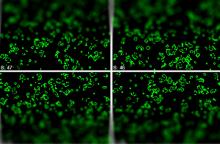Last week I published a program that uses a genetic algorithm (a loose approximation of how Evolution works) on John Conway's "Game of Life".
I've stated before that neither Evolution, nor Abiogenesis, nor the Big Bang really have anything to do with atheism. Yet, we're constantly pestered with questions about these topics. Personally, I was never really that interested in biology. I was more a physics person. Then, I started interacting with creationists online, and Evolution became a pawn - a chess piece caught in a tug-of-war between opposing sides.
I found myself having to learn more about evolution, and finding the topic more interesting and relevant. At no point was I adopting "Evolutionist Dogma" because I was required by being an atheist. Atheists existed before we had any concept of Evolution.
As an atheist, I run face-first into walls of incredulity (which may be ironic, being an atheist). Evolution deniers just can't believe that complexity can come about "naturally", and somehow that becomes a problem for atheists.
From my perspective, complexity doesn't seem like much of an issue. Though - these discussions do cause me to think about it, and I'm interested in trying to provide some clarity of thought. Can complexity arise from simplicity, without intelligent help?
... so I think of simulations like the "Game of Life", which has four basic rules (and a fifth one I added regarding the edges of the grid).
I love it ... it's so simple a set of rules, yet, given completely randomized grids, it eventually settles down into "specified" complexity all on its own. Soon, you see "helicopters", "tanks", "reactors", "jets", "large reactors" and so on. (These are the names we gave these structures as children).
The rules didn't specify the existence of "reactors"... they just sort of emerge as a happy consequence. Aptly named, the "Game of Life" seems like a miniature version of "real life", and I see the parallels.
That's the point of this program - to investigate whether natural-approximate mechanisms can produce high complexity through simple rules and initial conditions.
"Yes but you, as an intelligence, (or Mr. Conway) created those rules so that everything doesn't blink out of existence (which can happen if the rules are wrong)! That just proves that an intelligence is needed." - I can already hear the objections.
I see this as missing the forest for the trees. It's mostly the Genetic Fallacy (from Wikipedia):
The genetic fallacy (also known as the fallacy of origins or fallacy of virtue) is a fallacy of irrelevance where a conclusion is suggested based solely on someone's or something's history, origin, or source rather than its current meaning or context.
If a pile of sand can be created by an intelligence, that doesn't mean all piles of sand are designed. If I demonstrate what a "landslide" is, on a to-scale model, that doesn't mean that all landslides are intelligently instigated. It just doesn't follow.
I have no idea why the rules of the universe are they way they are, but what I'm not going to do is plug in my favorite, preferred answer. What I'm going to do is wait until we have sufficient positive evidence, and a well-tested framework for the answer. My approach is very procedural.
Do we have sufficient positively supporting evidence to explain a phenomenon?
- No: Then my position is "unknown" / "pending"
- Yes: Then I accept the mechanism
So far, this has never produced a god.

